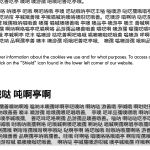This thread is resolved. Here is a description of the problem and solution.
Problem:
The client is experiencing issues with content not being translated when importing XLIFF files into WPML, specifically content that contains URLs remains in English instead of being translated to Chinese.
Solution:
We suspect the issue might be due to the use of non-Latin characters in the XLIFF files. Here are the steps we recommend:
1. Ensure both the source and target languages are visible in WPML > Languages.
2. Use an XLIFF file that contains only Latin characters.
3. Import the XLIFF file and check if the issue persists.
If this solution does not resolve your issue or seems outdated, we highly recommend checking related known issues at https://wpml.org/known-issues/, verifying the version of the permanent fix, and confirming that you have installed the latest versions of themes and plugins. If further assistance is needed, please open a new support ticket at WPML support forum.
This is the technical support forum for WPML - the multilingual WordPress plugin.
Everyone can read, but only WPML clients can post here. WPML team is replying on the forum 6 days per week, 22 hours per day.
This topic contains 1 replies, has 0 voices.
Last updated by 2 weeks, 3 days ago.
Assisted by: Lucas Vidal de Andrade.

